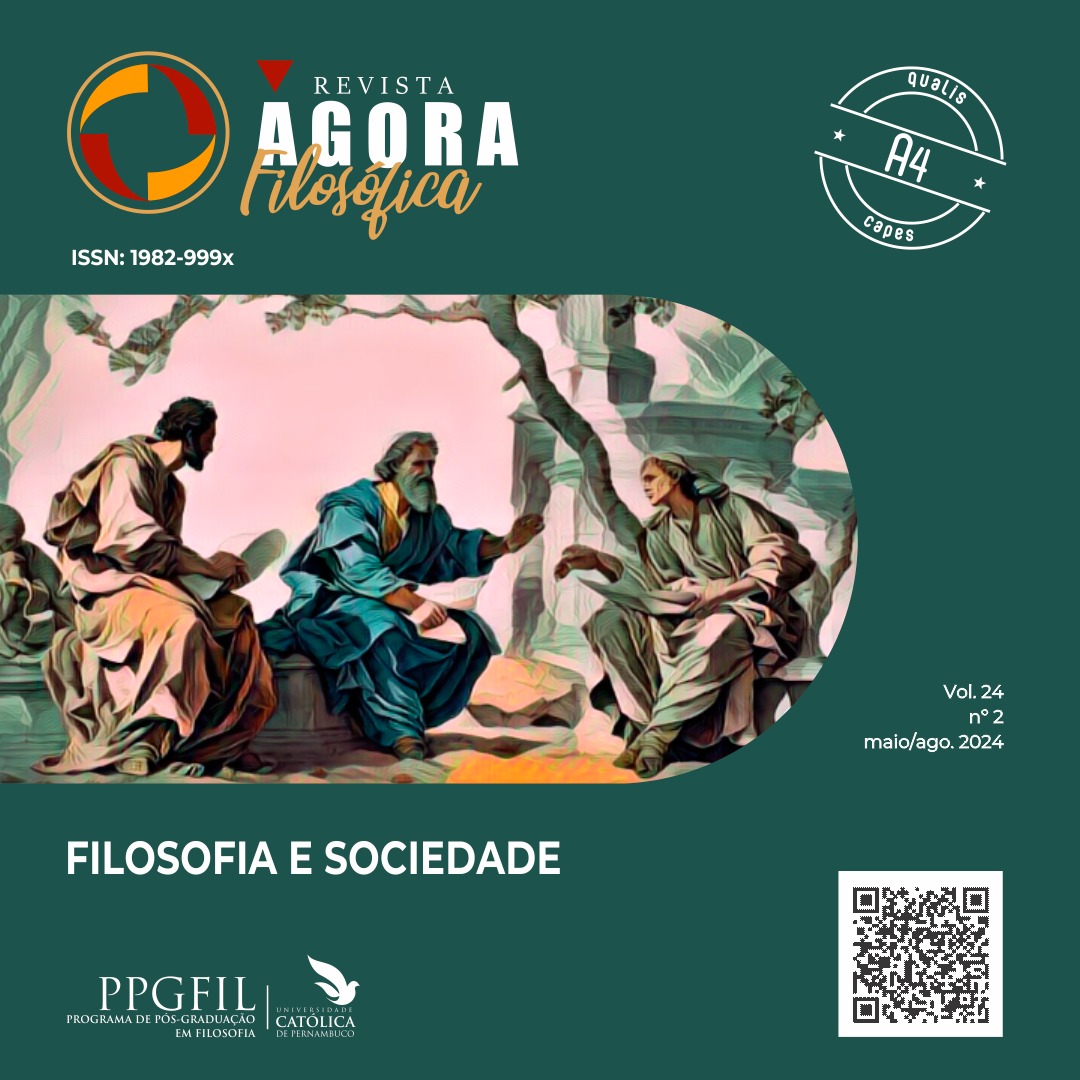Man as a terminal end in the kantian perpetual peace project
DOI:
https://doi.org/10.25247/P1982-999X.2024.v24n2.p249-264Keywords:
Terminal end, Perpetual peace, Immanuel Kant, Political philosophyAbstract
The purpose of this article is to reflect on the theme of man as a terminal end in the kantian peace project, considering the need to understand the role of the individual, as a moral subject, in the steps to perpetual peace. In order to do that, takes place an analysis divided into two parts, at which it will evaluate, at first moment, the concept of the terminal end in kantian philosophy and its correlations in the areas of human progress and its consequent dignity; in a second moment, the role of man as an active moral subject in the formation of a civil community capable of administering law and its derivatives in kantian public law thinking. Finally, the role of man, as the terminal end of creation, in overcoming his mechanistic condition of existence for his consequent performance as a moral subject in the creation of a civil society that moves towards effective perpetual peace, will be exposed.
Downloads
References
ALTMAN, Matthew C. Kant and applied ethics: the uses and limits of Kant’s practical philosophy. Nova Jersey: John Wiley & Sons, 2011.
ANDERSON-GOLD, Sharon. Kant’s ethical anthropology and the critical foundations of the philosophy of history. History of Philosophy Quarterly. v. 11, n. 4, p. 405-419, 1994.
DENIS, Lara. Individual and collective flourishing in Kant’s philosophy. Kantian Review. v. 13, n. 01, p. 82-115, 2008.
FERRAZ, Carlos Adriano. Acerca do papel do juízo teleológico na realização do sumo bem moral em Kant. Studia Kantiana. n. 9, p. 88-117, 2009.
HÖFFE, Otfried. Immanuel Kant. Tradução: Christian Viktor Hamm e Valério Rohden. São Paulo: Martins Fontes, 2005.
HÖFFE, Otfried. O ser humano como fim terminal: Kant, Crítica da faculdade do juízo, §§ 82-84. Studia Kantiana. n. 8, p. 20-38, 2009.
KANT, Immanuel. A metafísica dos costumes. (MS) AA06: 1797. Tradução: Edson Bini. Bauru: EDIPRO, 2003.
KANT, Immanuel. À paz perpétua. (ZeF) AA08: 1803. In: À paz perpétua e outros opúsculos. Tradução: Artur Morão. Lisboa: Edições 70, 2016.
KANT, Immanuel. Antropologia de um ponto de vista pragmático. (Anth) AA07: 1798. Tradução: Clélia Aparecida Martins. São Paulo: Iluminuras, 2006.
KANT, Immanuel. Conjectures on the beginning of human history. (MAM) AA08: 1786. In: Kant: Political Writings. Trans. H. B. Nisbet. Cambridge: Cambridge University Press, 1991.
KANT, Immanuel. Crítica da faculdade do juízo. (KU) AA05: 1790. Tradução: Valério Rohden e Antonio Marques. Rio de Janeiro: Forense Universitária, 1995.
KANT, Immanuel. Fundamentação da metafísica dos costumes. (GMS) AA04: 1785. Tradução: Paulo Quintela. Lisboa: Edições 70, 2007.
KANT, Immanuel. Ideia de uma história universal de um ponto de vista cosmopolita. (IaG) AA08: 1784. Tradução: Rodrigo Naves e Ricardo Terra. São Paulo: Martins Fontes, 2003.
KANT, Immanuel. Sobre a pedagogia. (Päd) AA09: 1803. 2. ed. Tradução: Francisco Cock Fontanella. Piracicaba: Unimep, 1999.
KLEMME, Heiner. Filosofia política de Kant: moral e direito na perspectiva histórica e futura. Kant e-Prints. v. 5, n. 4, p. 08-61, 2010.
MUNZEL, G. Felicitas. Kant’s conception of moral character: the “critical” link of morality, anthropology, and reflective judgment. Chicago/London: The University of Chicago Press, 1999.
NODARI, Paulo César. Humanidade e dignidade em Kant. Veritas. v. 61, n. 1, p. 107-129, 2016.
PINHEIRO, Celso de Morais. Sociedade justa: palco para o progresso moral do homem em Kant. Ethica. v. 3 n. 2, p. 145-162, 20004.
SCHERER, Fábio César. Da garantia do progresso do gênero humano no Kant tardio. Studia Kantiana, v. 15, n. 3, p. 05-21, 2017.
SENSEN, Oliver. Kant on human dignity. Berlin: De Gruyter, 2011.
SUPRENANT, Chris W. Cultivating virtue: moral progress and the Kantian state. Kantian review, v. 12, n. 1, p. 90-112, 2007.
Downloads
Published
Issue
Section
License
Copyright (c) 2024 Cleiton Marcolino Isidoro dos Santos

This work is licensed under a Creative Commons Attribution 4.0 International License.
You are free to:
- Share — copy and redistribute the material in any medium or format for any purpose, even commercially.
- Adapt — remix, transform, and build upon the material for any purpose, even commercially.
- The licensor cannot revoke these freedoms as long as you follow the license terms.
Under the following terms:
- Attribution — You must give appropriate credit , provide a link to the license, and indicate if changes were made . You may do so in any reasonable manner, but not in any way that suggests the licensor endorses you or your use.
- No additional restrictions — You may not apply legal terms or technological measures that legally restrict others from doing anything the license permits.
Notices:
You do not have to comply with the license for elements of the material in the public domain or where your use is permitted by an applicable exception or limitation .
No warranties are given. The license may not give you all of the permissions necessary for your intended use. For example, other rights such as publicity, privacy, or moral rights may limit how you use the material.
















